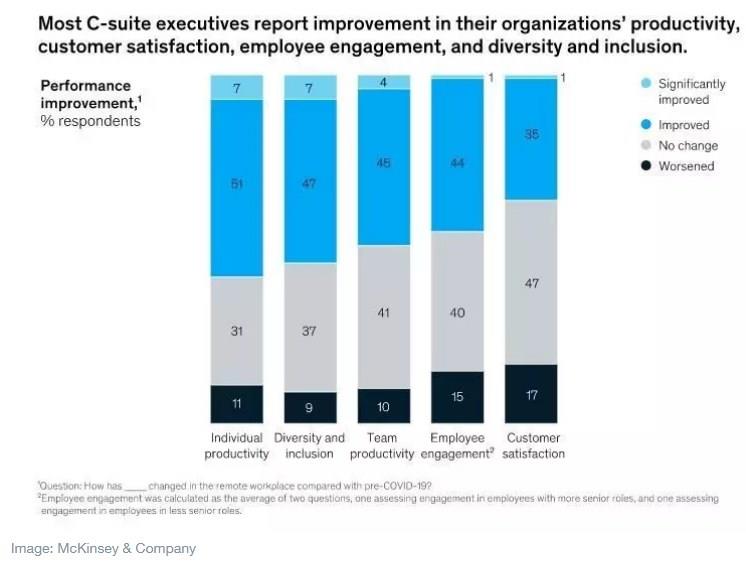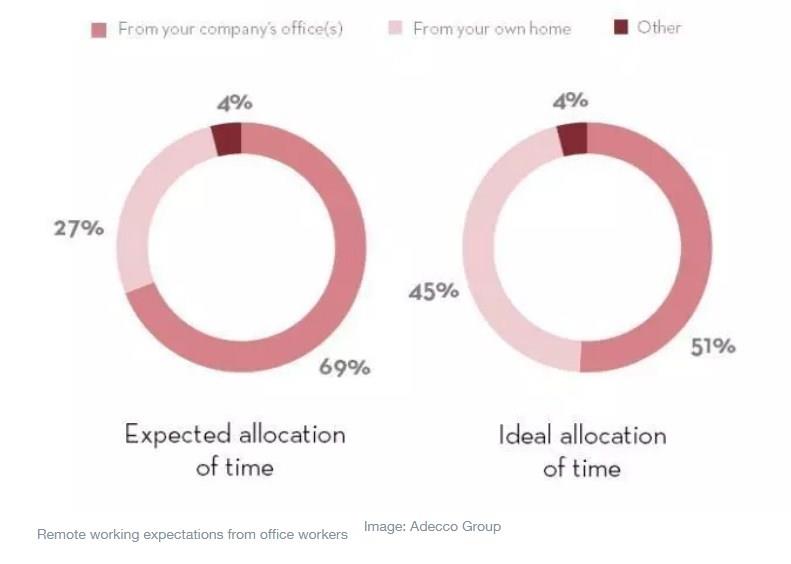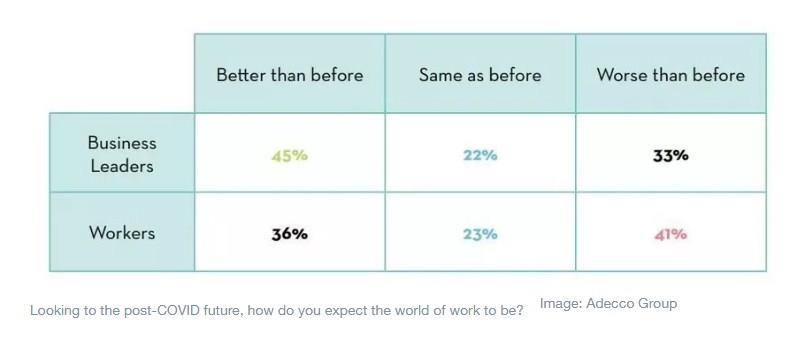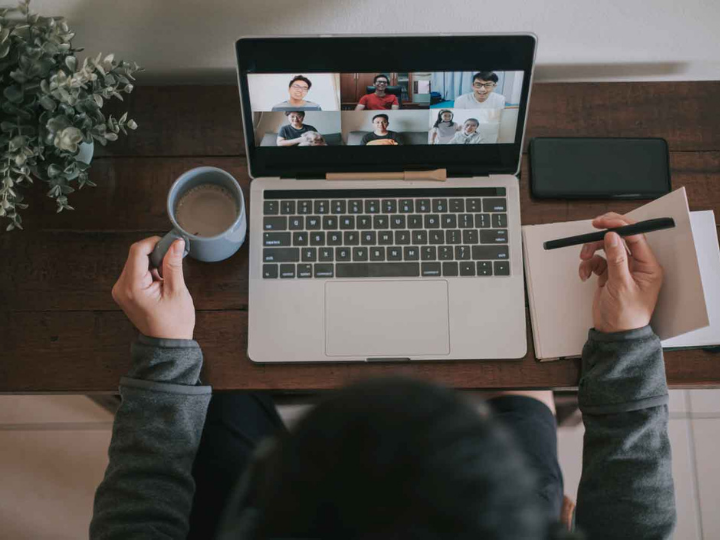by Gayle Markovitz*
There is a global debate raging about the future of the office. The pandemic has seen office working life upended for the world’s 1.25 billion “knowledge workers”: those people who have spent much of the past 18 months at home in front of a screen.
So as vaccination programmes are rolled out, and economies in some countries are able to reopen, businesses are starting to redefine the future for their office workers.
The context is that in 2020, the global workforce lost an equivalent of 255 million full-time jobs, an estimated $3.7 trillion in wages and 4.4% of global GDP. Remote work has only been available to a largely well-paid minority. The emptying of offices, however, has left city centres deserted, with profound impacts on urban economies.
Businesses that serve office workers – the cafes, dry-cleaners and sandwich shops – have been grounded. There are big questions about the future of urban mobility as commuters have stayed at home. Residential and commercial rents in urban centres have been dropping, and consumption patterns are changing – sales of home office equipment are soaring, whereas fewer people are spending on transport.
Digitalization: the office had it coming
The writing has been on the wall since the term “telecommuting” came about in the early 1970s. Digitalization promised a new era for working life, but the cultural transformation lagged – until COVID-19.
Now, the nine-to-five is an endangered model. Working from home is a 24-hour opportunity (or bind – depending on your viewpoint) and bosses have been forced to appraise their staff on productivity and outputs rather than hours or presenteeism.
McKinsey’s research on C-suite insights into the future of hybrid work found that 67% of organizations with remote working in place saw a rise in productivity, customer satisfaction, employee engagement and diversity and inclusion.
For the parallel “gig economy”, there have been setbacks, but it remains strong and reinforces the trend towards pay for what you do, regardless of when or where you do it.

Social waves
Salesforce’s Gavin Patterson suggests that the reinvention of office culture is poised to make bigger social waves, “This isn’t just about the future of work. This is about the next evolution of business culture and of society – business helping to build a resilient platform for positive change and growth.”
The social waves are already in motion. A recent survey by PwC found that after a year of remote work, there is a “nomadic trend” among employees, with 22% considering or planning to move more than 80km away from a core office location.
Adecco Group found three in four employees would appreciate a flexible work scenario, and figures suggest workers are not afraid to change jobs over the issue. A US survey shows 26% of workers are planning to leave their current job over the next few months, citing flexibility as one of the reasons.

Winners and losers
Many workers have made big wins from remote work such as savings on transport, better work-life balance and more autonomy. Managers have had to trust their staff more, and zoom calls have been a great leveller – removing barriers for those unable to attend in person. Remote working was highly requested (but often refused) by disabled people before the pandemic; online working now offers a much more inclusive experience.
And then there have been the losers. Experiences diverge greatly depending on personal situations – such as space, childcare responsibilities, the nature of the job itself and the individual temperament of the person.
Women have borne the brunt of the care juggle – as home-schooling and limited care options for kids made remote working a nightmare scenario for many parents. For some younger workers or those without families, working from home has been isolating – leading to depression and burnout.
Hybrid work. But what does that look like?
An inflexible one-size-fits-all solution will suit no one; hence the “hybrid” model seems most probable, where the office becomes more of a “hub than a second home”. But while there is broad consensus and data to support the move towards hybrid work, how that might look remains vague.
If workforces become mobile entities, aside from big questions around human resourcing costs where employers might have access to cheaper remote workforces, or employees may have to accept pay cuts relative to local costs of living, how does a tax system that is directed at 100% office-based working relate to a new hybrid? In the US for example, if directors and partners are working across state lines, there are compliance issues and the question of tax residence for companies.
Phumzile Mlambo-Ngcuka, executive director of UN Women, has warned that with women more likely to opt to work from home to fit in with their domestic responsibilities, there is a risk that “offices may just end up being the places where men go”.
There are also signs that senior executives are returning to offices, but staff are not following suit, jeopardizing the chances for diversity even further.
Leading the change
How are leaders managing the transition? The answer is with mixed success. The current sense of uncertainty and lack of clarity from business leadership is hurting worker morale and highlighting the urgency of defining the post-COVID-19 knowledge-worker model.

Here are some examples and tools from the Forum’s business partners, which reveal insights into the fate of the office and how its reincarnation might improve on the models of the past.
Accessibility
Microsoft has launched a commitment to a more accessible workplace, with "tips on how to use tech to ensure you provide a more accessible digital experience for everything from having captions on videos and meetings to taking accessibility into consideration during the interview process".
Reckoning on skills, talent and robots
Accenture is creating a manifesto for a new world of working, raising all the right questions, “Which skills will be obsolete, which will be more important than ever? How should the collaboration between humans and machines work? How do we lead and how do we learn? Do we still actually need office spaces or is home office sufficient? What function will our work spaces have? And: Are next-generation talents still looking for one long-term employer at all?"
Mental health at work
The Wellcome Trust is pushing mental health on the agenda for the workplace, setting out why businesses and researchers need to work together to take a more scientific approach to supporting mental health at work. “Mental health has never been higher on the agenda for businesses. It is easy to see why, as even prior to COVID-19, anxiety and depression were estimated to cost the global economy over $1 trillion every year in lost productivity. The exodus from offices in 2020 has presented further challenges and raised big questions about future ways of working”, says Miranda Wolpert, Director, Mental Health, Wellcome Trust.
Inclusive tech
Heidrick & Struggles has analysed how putting inclusion at the core of decisions about technologies will help rally staff behind a collective purpose and cultivate a sense of belonging, “To retain the flexibility and inclusion many organizations have gained in the past year and avoid the pitfalls of a hybrid workplace, leaders must plan carefully how they use digital tools and how technologies are deployed across their organizations.”
Innovation
Tech companies including Google and Salesforce offer models for innovation. “As companies rethink what agile teams and ways of working look like, future employee experiences will likely be more empowering through more flexible working arrangements and more immersive with reimagined workspaces”, says Gavin Patterson, President and Chief Revenue Officer, Salesforce.
Google’s Sundar Pichai reveals, “I’m optimistic these changes will help us do our best work and have fun doing it, with about 60% of Googlers working together in the office a few days a week, 20% working in new office locations and 20% working from home.”
Cautious change
Subject to tighter controls on privacy and cross-border regulation, banks are tending to be more cautious. JP Morgan has outlined a detailed schedule for a rotating return to the office from July with a 50% occupancy cap, Goldman Sachs CEO, David Solomon, says “I do think for a business like ours, which is an innovative, collaborative apprenticeship culture, this (remote work) is not ideal for us. And it’s not a new normal.” But KPMG argues that we will see permanent changes and a “new reality” for banks.
Data
McKinsey has undertaken useful research into: what employees are saying about remote work; what executives are saying about the future of hybrid work; and how jobs will change as a result of remote work.
Doing it right
The big lesson from the work-from-home revolution is that progress is not always linear and not always fair. Offices don’t necessarily get bigger, city centres may not get denser and the infinite expansion of transport infrastructure might need a rethink. If there is a red line through the latest developments, it is that the hybrid work revolution could address social inequity and provide a more inclusive recovery for all. If it’s done right.
*Partnerships Editor, World Economic Forum
**first published in: www.weforum.org




 By: N. Peter Kramer
By: N. Peter Kramer
